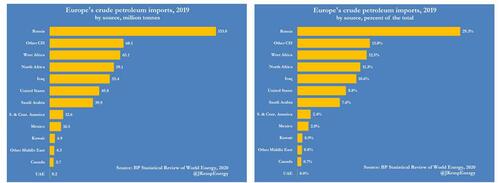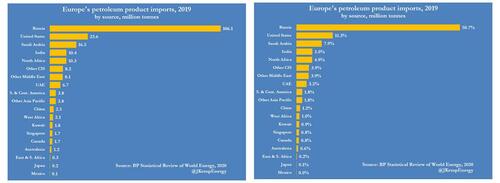
by John Kemp at Reuters and by Tyler Derden at Zero Hedge
EU leaders have stepped back from imposing an immediate embargo on Russian crude and petroleum product imports as the impracticality of the policy has become clear. Imposing an immediate embargo on Russia’s fossil fuels “from one day to the next would mean plunging our country and the whole of Europe into a recession,” Chancellor Olaf Scholz told German lawmakers this week.
Russia’s exports of crude and petroleum products to Europe are the second largest bilateral flow of oil between any two trading partners in the world, behind the United States and Canada, according to data from BP.
Russia supplied 29% of Europe’s crude imports and 51% of the continent’s petroleum product imports in 2019, the last year before the pandemic (“Statistical review of world energy”, BP, 2020).
No other trading partner came close to Russia’s share, which would make it extremely hard to replace in the short term.
So even speculation about a possible ban drove oil prices sharply higher this week, as traders weighed the practical difficulties, before prices retreated as it became clear EU policymakers were backing away from the idea.
New Oil Order?
Some embargo advocates have suggested the EU could ban Russian petroleum imports, then encourage the redirection of international flows to minimize the net loss of supplies from causing a spike in prices. In this scenario, sanctioned Russian crude would be left to buyers in China and India, freeing up crude from the Middle East to be delivered to refineries in Europe.
On the product side, Russian fuel oil and distillates could be sent to South America, Africa and Asia, while Europe takes more unsanctioned products from the United States, China, India and the Middle East.
But there are multiple serious obstacles to making this work…
Continue Reading

